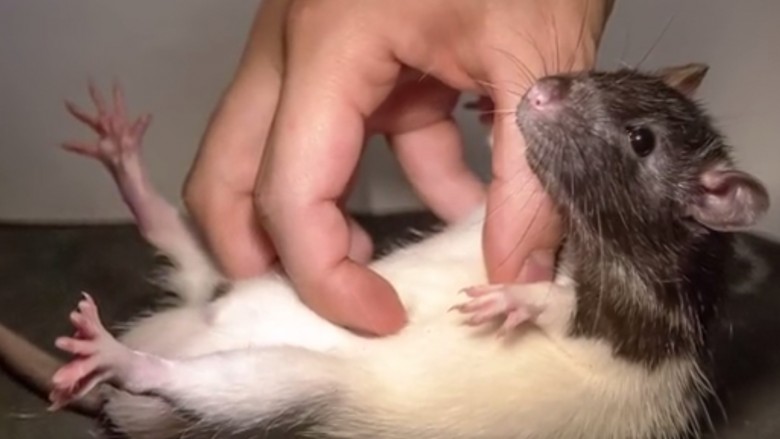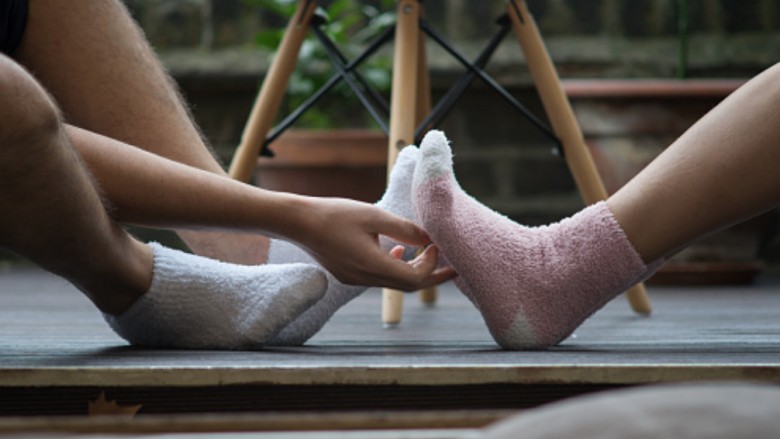The Weird Science Behind Tickling
Tickling is a lot like VR: 99 percent of the time, it is much more fun to watch it happen to someone else. Much like virtual reality, tickling tricks our bodies into reacting reflexively. Being tickled does some pretty funny things to our brains, too, only with far fewer dinosaur scenarios, video games, or awkward stumbles. It may even cause our brains to feel a little more fear (perhaps that's why the Nazis used tickle torture during World War II). But the benefits of tickling outweigh the discomfort in some pretty shocking ways.
Tickling can make fear go away, and we know this thanks to rats
Some very important neuroscience research has concluded that rats both LOVE to be tickled and respond to tickling by laughing. Rats: they're just like us! And if you've never heard a rat laugh or even giggle, that's totally normal because rats laugh at ultrasonic frequencies. In layman's terms, this means their hysterical chuckles are emitted at a pitch humans can't even hear. Not even Christina Aguilera.
These very important rat tickling experiments concluded that tickling can fool brains into getting over innately programmed fears. According to this study, it may be possible to have your pesky anxiety literally tickled right out of you. Here's the not so fun part: to prove this theory, researchers zapped a whole bunch of rats for two weeks after ruining their eardrums by playing a horrifying tone which seems like something straight out of Mars Attacks. Remember Pavlov's dogs? It's basically like that, except with rats.
Based on previous research, the scientists speculated that if they tickled the rats prior to torturing them, they would develop new neurological connections in their hippocampuses. Thanks to their tickling sessions, these new connections would allow their tiny rodent brains to form happy new memories and ultimately no longer fear the treachery of the electric shocks. Rats:1, Fear: 0.
So tickled to hear how important this all is
So if tickling is so ubiquitous, there must be some important human element behind it, right? Yep. Ticklishness is an important evolutionary trait that serves a fundamental purpose.
Have you ever noticed that it's impossible to tickle yourself? That's where the beneficial aspects of tickling start. We're ticklish so our brains tell the difference between touching something and being touched. If something is touching you, it might tickle. It might then try to land on you and take a big bite and suck your blood. And we're not just talking about vampires here — think about ticks, for example. Just one of these evil little parasitic creatures packs a bite tough enough to poison your bloodstream forever with its insidious Lyme disease. So the most ticklish of us are more impervious to unwanted bites because our skin is so sensitive that we notice the second an intruders tries to land.
Of course, it doesn't work every time, but it's still a bona fide benefit of being the most ticklish member of your squad.
Laughing while being tickled is a reflex
You laugh, and even smile, when you're tickled, even though you're probably hating every second of it. Your wonderful brain makes all of this possible because your post-tickle laughter is a reflex, the same kind that causes your knee to kick when your doctor taps it with a tiny rubber mallet. Research has concluded this by studying infants. While infants lack the social developments and language skills to form cognitively biased reactions, they still laugh when they are tickled because they really can't help it.
This is one of hundreds of involuntary reflexes, in which our brains go ahead and override our conscious decision-making to carry out a motor response to protect us from dying. Our reflexes also help us see, maintain a healthy blood pressure, and even blush to let everyone know how humiliated it felt to trip over the curb, even if it did bring joy to the unsuspecting onlookers.
Tickling: the least funny joke
Much like when you're reading hilarious articles online, being tickled results in rip-roaring laughter. This prompts a question: Is tickling a joke?
Charles Darwin thought so. He thought the whole tickle thing was a "physical joke," but researchers have concluded differently. Although we might appear to be smiling and laughing while being tickled, we're internally begging you to stop.
In a 2005 study published in the journal Cognition and Emotion, 84 adult volunteers were observed in their various reactions to different forms of humor, including Darwin's "physical joke" of tickling. First, the volunteers watched a series of stand-up comedy. They laughed authentic laughs and smiled genuinely. Second, they were tickled. As a bonus, researchers also documented the participants' reactions to submerging their hands in icy water. The participants didn't laugh at this (though the researchers surely did)—this part of the experiment aimed to elicit pain, for contrast.
After the jokes, the tickling, and ice bucket challenges, the researchers interviewed each volunteer about their experiences under each of the three sessions. Although the participants appeared to be laughing and smiling throughout the tickling and comedy (but not during the ice torture), there were observable differences in their smiles. Much like people may cry when cutting an onion without feeling sad, we do the same thing when we laugh while being tickled. So cut it out already, you ticklemonsters. We're fake-smiling.
Tickle your kids and have GREAT kids!
Charles Darwin had a lot of opinions on the importance of tickling. He considered tickling to be a necessary cornerstone of our humanity as it affects how we bond with each other, especially when the tickler and tickle-ee are parent and child. It's pretty important for a parent and child to be happy and have opportunities to bond, and according to Darwin, tickling is the perfect opportunity for that. Picture it: smiles, laughter, two people connecting, and like magic, a timeless bond is formed.
So if you're trying to bond with your kids, tickle them into liking you. We do however advise against trying this with teenagers. They'll probably end up roasting you on their Snapchat story or something.
Tickling is oddly great for heart health ... if you pick the right spot
Okay, this may sound like something you'd hear from a daytime TV quack doctor, but bear with us for a second.
Neuroscientists have discovered that tickling your ears potentially helps the heart and can even prevent heart failure. In studies, researchers applied electromagnetic devices commonly used to treat chronic pain to the ears of human volunteers. The electrode was carefully placed on the tragus—that's the tiny middle part that trendy people love to get pierced. After the traguses of the subjects were electronically tickled, they experienced an almost instantaneous signal to their beating hearts, preventing irregularities in their heartbeats. This shock treatment, which seems like it's straight out of science fiction, majestically helped the participants adjust to normal heart rates.
Perhaps the next time you're live tweeting a seemingly horrifying segment on the evening news, you should ditch the social media and zap your ears into not having a heart attack.






